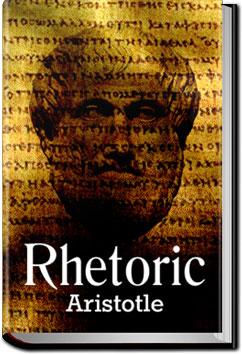UNLIMITED Audiobooks and eBooks
Over 40,000 books & works on all major devices
Get ALL YOU CAN for FREE for 30 days!
Rhetoric
Aristotle
Book Overview:
The Rhetoric was developed by Aristotle during two periods when he was in Athens, the first when he was seconded to Plato in the Academy, and the second when he was running his own school, the Lyceum.
The Rhetoric consists of three books.
Book I offers a general overview, presenting the purposes of rhetoric and a working definition; it also offers a detailed discussion of the major contexts and types of rhetoric.
Book II discusses in detail the three means of persuasion that an orator must rely on: those grounded in credibility (ethos), in the emotions and psychology of the audience (pathos), and in patterns of reasoning (logos).
Book III introduces the elements of style (word choice, metaphor, and sentence structure) and arrangement (organization). Some attention is paid to delivery, but generally the reader is referred to the Poetics for more information in that area.
The Rhetoric was developed by Aristotle during two periods when he was in Athens, the first when he was seconded to Plato in the Academy, and the second when he was running his own school, the Lyceum.
The Rhetoric consists of three books.
Book I offers a general overview, presenting the purposes of rhetoric and a working definition; it also offers a detailed discussion of the major contexts and types of rhetoric.
Book II discusses in detail the three means of persuasion that an orator must rely on: those grounded in credibility (ethos), in the emotions and psychology of the audience (pathos), and in patterns of reasoning (logos).
Book III introduces the elements of style (word choice, metaphor, and sentence structure) and arrangement (organization). Some attention is paid to delivery, but generally the reader is referred to the Poetics for more information in that area.
How does All You Can Books work?
All You Can Books gives you UNLIMITED access to over 40,000 Audiobooks, eBooks, and Foreign Language courses. Download as many audiobooks, ebooks, language audio courses, and language e-workbooks as you want during the FREE trial and it's all yours to keep even if you cancel during the FREE trial. The service works on any major device including computers, smartphones, music players, e-readers, and tablets. You can try the service for FREE for 30 days then it's just $19.99 per month after that. So for the price everyone else charges for just 1 book, we offer you UNLIMITED audio books, e-books and language courses to download and enjoy as you please. No restrictions.
The body of the womb is where the child is conceived, and this is not altogether round, but dilates itself into two angles; the outward part is full of sinews, which are the cause of its movements, but inside it is fleshy. It is wrongly said, that in the cavity of the womb there are seven divided cells or receptacles for the male seed, but anatomists know that there are only two, and also that those two are not divided by a partition, but only by a line or suture running through the middle of it.
At the bottom of the cavity there are little holes called cotyledones, which are the ends of certain veins or arteries, and serve breeding women to convey nourishment to the child, wh. . . Read More
Try now for FREE!

"Love your service - thanks so much for what you do!"
- Customer Cathryn Mazer
"I did not realize that you would have so many audio books I would enjoy"
- Customer Sharon Morrison
"For all my fellow Audio Book & E-Book regulars:
This is about as close to nirvana as I have found!"
- Twitter post from @bobbyekat



Community Reviews
In the Art of Rhetoric Aristotle does more than it seems possible given the length of the book. In under 160 pages he provides a comprehensive description of virtually all components of effective, persuasive, logical, and stylish communication. Even this description is too limiting. He captures the
این کتاب در اواسط قرن چهارم توسط ارسطو نوشته می شود. از نقاط قوت کتاب می توان به بررسی و تحقیق آن حتی در عصر حاضر اشاره کرد. این کتاب در بردارنده ی مطالبی راجع به فلسفه، حکمت، تاریخ، ادبیات و... است که بیانگر نگاه جامع و دقیق ارسطو نسبت به مسائل می باشد.از نگاه ارسطو،"خطابه" ازجمله فنونی است که می ت
I'm sure it's excellent, necessary, brilliantly designed, etc. But so is a sewer system, and you don't want to spend too much time there either.
You may never have read anything by Aristotle; but if you've ever taken a college writing course, you've had him as your teacher. The Art of Rhetoric did so much to define how subsequent generations, and civilizations, regarded the task of crafting persuasive language that it can truly be regarded a
Not Aristotle's clearest or best organized work, but still part of the core curriculum of a liberal education.
Why read Aristotle today? Because he is one of the greatest minds in Western history, and such a person's well-considered thoughts are inherently worth reading, if anything is.
In addition, t
Aristoteles'in Platon'un "Gorgias"da bahsettiği Retorik kavramını bir üst seviyeye taşıdığı eseri "The Art of Rhetoric / Retorik", insani tutumlara dair mükemmele yakın tanımlamarıyla adeta bir hayat sözlüğü niteliğinde. Kıskançlık, kibir, gurur, hırs, yaşlılık, gençlik gibi bir sürü kavramın açıkla